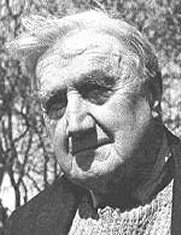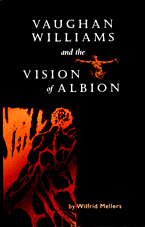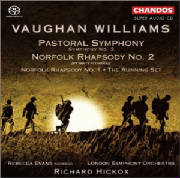|
the essence of 'Englishness'.

Born on October 12, 1872 in the Cotswold village of Down Ampney,
Gloucestershire, England, Ralph Vaughan Williams (pronounced
"Rafe") is arguably the greatest composer Britain has seen. In a long and extensive career he composed music notable
for its power, nobility and expressiveness, representing, perhaps, the essence of 'Englishness'.
Educated at Charterhouse
school, then Trinity College, Cambridge, he was later a pupil of Stanford and Parry at the Royal College of Music. He later
studied with Max Bruch in Berlin and Maurice Ravel in Paris.
At the turn of the century he was among the very
first to travel into the countryside to collect folk-songs and carols from singers, notating them for future generations to
enjoy. As musical editor of The English Hymnal he composed several hymns that are now world-wide favourites (For all the
Saints, Come down O love Divine). Later he also helped to edit The Oxford Book of Carols, with similar success.
Vaughan Williams volunteered
to serve in the Field Ambulance Service in Flanders for the 1914–1918 war, during which he was deeply affected by the
carnage and the loss of close friends such as the composer George Butterworth.
Before
the war he had met and then sustained a long and deep friendship with the composer Gustav Holst. For many years Vaughan Williams
conducted and led the
Leith Hill Music Festival, one of England's leading choral events, conducting
Bach’s St Matthew Passion on a regular basis. He also became professor of composition at the Royal College of
Music in London.
In a long
and productive life, music flowed from his creative pen in profusion. Hardly a musical genre was untouched or failed to be
enriched by his work, which included nine symphonies, five operas, film music, ballet and stage music, several song cycles,
church music and works for chorus and orchestra.
In his lifetime, Vaughan
Williams eschewed all honours with the exception of the Order of Merit which was conferred upon him in 1938. He died in London
on 26th August 1958. Fittingly his ashes are interred in Westminster Abbey, near those of that other great
in English music, Henry Purcell (1659-1695)
 |
 |
|
RVW Fact
Leith Hill Place was Vaughan
Williams’ home from the age of three until he left the Royal College of Music although he was regular visitor thereafter.
He inherited the property in 1944 but left the house and the surrounding area to the National Trust. The house had been built
in c1600 and bought by RVW’s maternal grandfather, Josiah Wedgwood.
The famous Leith Hill Festival took its name from the beauty spot nearby.
|
|
 |
 |
A Vision Of Albion

Originally published by Barrie & Jenkins in
1989, this book is a greatly revised and expanded edition, that was published by Albion Music in 1997.
It explores, if not defines, Vaughan Williams's message' as a composer who was actively creative through more than half of
a turbulent century. Key works as well as some lesser ones are analysed in detail with reference to scores. The new edition
incorporates a substantial amount of new material: notably three section on the operas Hugh the
Drover, Sir John in Love, and The Poisoned Kiss as well as an account of
the late A minor sonata for violin and piano.
English Folk Song Suite — common in the repertoire of military bands and wind ensembles.
Fantasia On Greensleeves
The Lark Ascending
A Sea Symphony — choral symphony on texts by Walt Whitman
A London Symphony
Symphony No. 5 in D
Sinfonia Antartica — based on his music for the film Scott of the Antarctic
|
 |
|
 |
 |
|
|
|
on his editing th English Hymnal
in 1904 (from
the BBC)
an incredibly informative and
well laid out website from and
by Jaron Collis aka agentsmith
Albion Music Ltd
(a division of the RVW Society)
has produced a set of 6 of very attractive
Musical Connections cards. These cards
are blank on the inside for you to write your
own messages. Painted in watercolour
by Bridget Duckenfield, the cards feature
views connected with
Ralph Vaughan Williams.
|
|
 |
 |

|
| Chandos CHAN10001 67m DDD |
|
 |
|
|
 |
|
|
|

